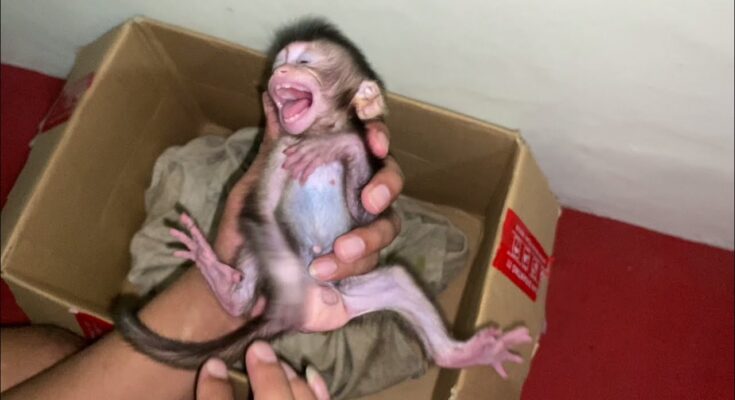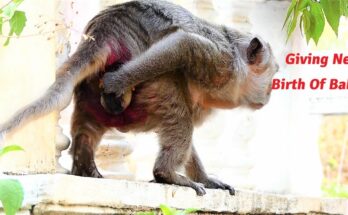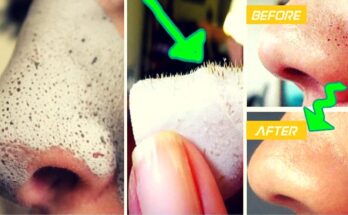Caring for a newborn baby monkey at home is a responsibility that requires dedication, patience, and specialized knowledge. Whether you’ve adopted an orphaned baby monkey or are caring for one temporarily, it’s important to understand their specific needs. Monkeys, especially babies, are highly social and sensitive animals, requiring extra care, attention, and a safe environment to thrive. Here’s a step-by-step guide on how to properly take care of a newborn baby monkey at home.
1. Creating a Safe and Comfortable Environment
The first thing you need to do when bringing a newborn baby monkey into your home is ensure they have a safe, secure, and comfortable space. Baby monkeys, like human infants, are vulnerable and need a quiet, calm, and stable environment.
- Temperature and Humidity: Newborn baby monkeys are highly sensitive to temperature and humidity. Make sure the room is warm (around 80°F or 27°C) and free from drafts. A small heater can be used to maintain the temperature, but be careful not to overheat the baby.
- Safe Space: Set up a small cage or a dedicated space where the baby monkey can’t escape or get hurt. Ensure the space is clean, well-ventilated, and free from dangerous objects. Place soft bedding, such as a blanket or towel, to provide warmth and comfort.
2. Feeding the Newborn Baby Monkey
Feeding is one of the most crucial aspects of caring for a baby monkey. Newborn monkeys typically rely on their mother’s milk for nourishment, but if you’re caring for an orphaned baby, you’ll need to substitute this with a proper feeding regimen.
- Milk Formula: You should never feed a baby monkey cow’s milk or human infant formula. Instead, purchase a high-quality primate milk formula that is specifically designed for the nutritional needs of monkeys. This formula can be found at specialty pet stores or online retailers.
- Feeding Schedule: Newborn monkeys require frequent feedings, typically every 2-3 hours for the first few weeks. As they grow, the frequency of feedings will decrease. Use a baby bottle with a nipple suitable for small animals to feed the baby monkey. You may also use a syringe if the monkey is too young to suck properly.
- Hydration: It’s also essential to make sure the baby stays hydrated. If the baby monkey is not feeding well, ensure they have access to water through a bottle or syringe.
3. Establishing a Bond
Newborn baby monkeys are highly social creatures that need constant companionship to develop emotionally and socially. Without the proper socialization, they can become anxious or depressed, which could hinder their development.
- Physical Contact: Spend plenty of time holding the baby monkey, as this mimics the bond they would have with their mother. Hold the monkey close to your body, providing warmth and comfort. Allow them to nestle into your arms or chest, as this will help form a sense of security.
- Scent and Touch: Baby monkeys rely on scents and touch to bond. You can wrap the baby monkey in a soft piece of fabric that has your scent to give them a sense of familiarity. Gentle, soothing strokes will also help calm them and foster a sense of trust.
4. Monitoring Health and Development
A newborn monkey’s health requires constant monitoring, as they are highly susceptible to infections and illness. Make sure to watch for signs of distress or health issues.
- Signs of Illness: Keep an eye on the baby monkey’s temperature, breathing, and bowel movements. If the baby monkey is lethargic, refuses to eat, or has abnormal stools, it could be a sign of infection or health issues, and you should contact a veterinarian immediately.
- Developmental Milestones: Just like any baby, newborn monkeys go through various developmental stages. By 2-3 weeks, they will begin to open their eyes. By 4-6 weeks, they will start to attempt to walk. Track their progress and consult an expert if their development seems delayed or if they aren’t hitting milestones.
5. Teaching Basic Hygiene
Baby monkeys are clean animals by nature, but they still need help with hygiene during the first few weeks of their life. In the wild, baby monkeys are groomed by their mothers, but you will need to replicate this care at home.
- Cleaning Them: Gently wipe the baby monkey’s body with a warm, damp cloth, especially around the face and bottom. Newborns may not yet be able to groom themselves, so keeping them clean is essential to avoid infections.
- Diapering: Depending on the age of the baby monkey, you may need to use baby diapers or other makeshift solutions to handle waste. This will help keep their environment clean and comfortable.
6. Socialization and Enrichment
As baby monkeys mature, they require mental stimulation and social interaction. In the wild, they would have constant contact with their family group. When kept at home, you need to replicate this social environment.
- Playtime: Introduce safe toys and objects that encourage play and curiosity. Monkey-safe toys, like rubber balls, mirrors, and ropes, can engage the baby monkey mentally and physically. These toys should be non-toxic and suitable for small animals.
- Socialization: If possible, introduce the baby monkey to other humans or even other pets (with caution). However, ensure these interactions are supervised to avoid stress or aggression. Monkeys are incredibly intelligent and may get bored or frustrated if they don’t have social interactions or stimulation.
7. Transitioning to Solid Foods
Around 6 months, baby monkeys begin to wean from milk and start eating solid foods. Introduce solid foods gradually to their diet to ensure they are getting the proper nutrients.
- Fruits and Vegetables: Fresh fruits and vegetables such as bananas, apples, and leafy greens should be introduced into their diet. However, avoid sugary or processed foods. Always chop these foods into small pieces to prevent choking.
- Monkey-Specific Diet: As your baby monkey grows, you can introduce foods such as monkey biscuits or specially formulated primate food that will meet their nutritional needs. Avoid feeding them human junk food, as it can cause serious health issues.
8. Preparing for the Long-Term Care
As your baby monkey grows, you need to plan for long-term care. Monkeys can live for decades, and many species require significant time and attention throughout their lives.
- Veterinary Care: Regular check-ups with an exotic animal vet are essential to ensure your monkey’s long-term health. Regular vaccinations, parasite control, and health monitoring are all critical to prevent disease.
- Space for Play and Exercise: Monkeys are active creatures and need plenty of space to move around and explore. A large enclosure or safe outdoor area will be crucial for their physical well-being. Consider building a monkey-proofed play area in your backyard or providing an indoor play space with climbing structures.
Conclusion
Caring for a newborn baby monkey is a big responsibility, but with the right knowledge, patience, and resources, it can also be a rewarding experience. Always ensure that the baby monkey’s environment is safe, comfortable, and enriching. Provide them with the proper nutrition, healthcare, and socialization, and be prepared for the long-term commitment that comes with raising an intelligent and social creature. With time, care, and love, your baby monkey can grow into a healthy, happy, and well-adjusted companion.



